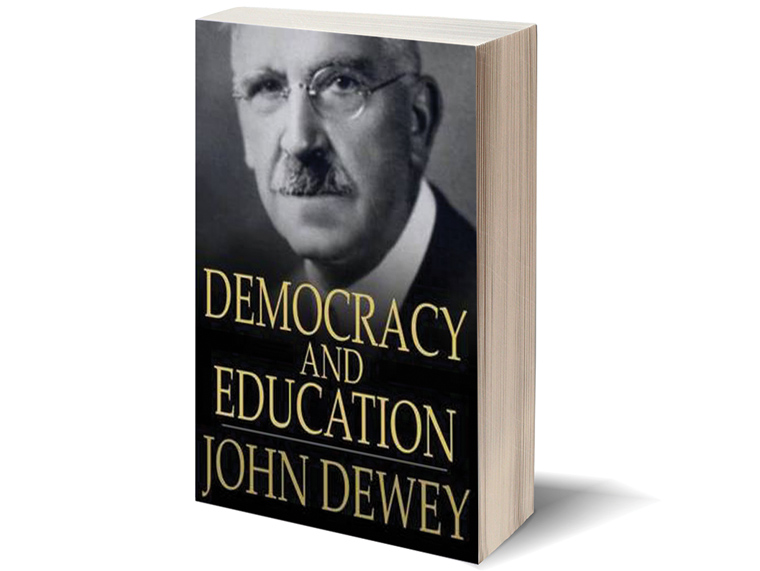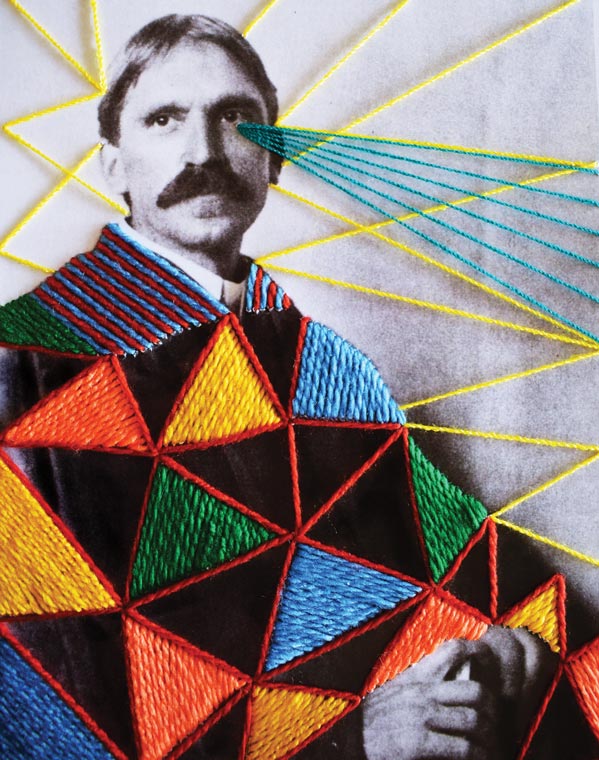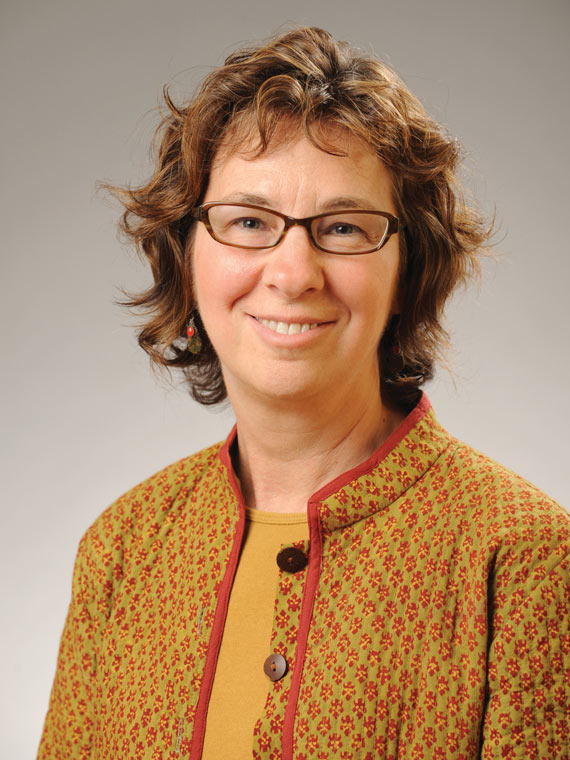John Dewey’s seminal book Democracy and Education, written in 1916, contains his most systematic introduction to the philosophy of education for which he is renowned. Much of the book is devoted to placing Dewey’s views in what he considered to be their historical and philosophical context, and he also lays out his ideas for a system of education based in students’ own interests and desires. He makes the case for the critical role of this kind of education in fostering and sustaining a democratic society, which he conceives of as offering equal access to all its members.
During fall semester, I led a seminar on “Dewey and Progressive Education” for faculty from across disciplines. For that discussion, I chose a few brief excerpts from the book that highlight these particular themes. In the following passages, Dewey introduces some of his key points. After each excerpt, I offer commentary on the issues Dewey raises. I have also included some reflections made in preparing for the seminar and during the conversation that transpired. This is also a story of my intellectual journey in coming to read and integrate Dewey’s ideas into my own work.
From “Education as Growth,” Chapter 4
“The primary condition of growth is immaturity. … Immaturity designates a positive force or ability—the power to grow. We do not have to draw out or educe positive activities from a child, as some educational doctrines would have it. Where there is life, there are already eager and impassioned activities. Growth is not something done to them; it is something they do.”
Here Dewey articulates the core of his view of learning as an active process, one that all children are inclined toward, as he goes on to explain in terms of curiosity and exploration of the world around them. In this sense, “immaturity” is a starting point, an open potential for taking in experience.
“From a social standpoint, dependence denotes a power rather than a weakness; it involves interdependence. There is always a danger that increased personal independence will decrease the social capacity of an individual. In making him more self-reliant, it may make him more self-sufficient; it may lead to aloofness and indifference. It often makes an individual so insensitive in his relations to others as to develop an illusion of being really able to stand and act alone—an unnamed form of insanity which is responsible for a large part of the remediable suffering of the world.”
This seems to me a remarkably prescient and timely statement about the inherently social context of all experience and learning. Dewey is taking a stand against the proverbial view of individuals “pulling themselves up by their bootstraps” in favor of a view of an interdependent society in which people take responsibility for one another. Dominant groups are particularly susceptible to this blindness to the benefits they have accrued from being part of a network of social interactions that have offered opportunities to grow and succeed. How easy it is to think that valuing self-sufficiency justifies denying these opportunities to others. This passage is a clear counterpoint and a warning about the misguided implications of a heightened individualism.
“The significance of habit … means formation of intellectual and emotional disposition. … Any habit marks an inclination—an active preference and choice for the conditions involved in its exercise. … A habit does not wait for a stimulus to turn up so that it may get busy; it actively seeks for occasions to pass into full operation. … Modes of thought, of observation and reflection, enter as forms of skill and of desire. … There are habits of judging and reasoning as truly as of handling a tool, painting a picture, or conducting an experiment.”
Here we see Dewey’s famous articulation of the role of “habit” as an active inclination of mind, holistic in that intellectual experience is connected to social and emotional aspects. These dispositions seek out opportunities to be practiced—as modes of thought, observation, and reflection, to be manifested as desires and skills. They are expressed across academic disciplines, arts, and practical activities.
“Hence education means the enterprise of supplying the conditions which insure growth, or adequacy of life, irrespective of age. … Active habits involve thought, invention, and initiative in applying capacities to new aims. Since growth is the characteristic of life, education is all one with growing; it has no end beyond itself. The criterion of the value of school education is the extent in which it creates a desire for continued growth and supplies means for making the desire effective in fact.”
Education is conceived in terms of Dewey’s general philosophy of pragmatism, where there is no separation of means and ends. The value of the enterprise is in its process of unfolding, and should be evaluated in terms of fostering the desire for continued learning. The contrast to a traditional model of education as a product that is acquired could not be clearer—such different assumptions generate starkly different goals: “What does one need to know?” vs. “What does one need to be?”
From “The Democratic Conception in Education,” Chapter 7
“An undesirable society is one which internally and externally sets up barriers to free intercourse and communication of experience. A society which makes provision for participation in its good of all its members on equal terms … is so far democratic. … A social return must be demanded from all and that opportunity for development of distinctive capacities must be afforded all. The separation of the two aims in education is fatal to democracy.”
Dewey’s emphasis here is on access and equality from the beginning. Since the inaugural symposium (and through some of the assigned readings), I have learned a great deal more than I previously knew about Dewey’s commitments to education reform, labor movements, and civil rights. In other writing, he explicitly connected his work for social justice with his views on education. This connection was expressed in terms of the goal of fostering for all citizens the power to integrate learning into one’s work in the world, and he discussed the impacts of different kinds of work (including the alienation caused by traditional schools and factory work) on individual psychology.
At the faculty seminar, we recognized and talked about the irreconcilable contradictions between this vision of engagement in work and the realities of the conditions under which most people tolerate their lives of labor. The conversation that followed turned to acknowledging the potential relationship to one’s work that includes “the capacity for an interior life.” This certainly follows Dewey’s orientation to the matter on an individual level—although it did not address the structural inequalities underlying these conditions. Clearly, fostering the conditions in which students feel capable and invested in their own ideas and critical reflection is also essential for a democratic society.
Personal Reflections
In planning for the seminar, I drew on themes from the inaugural symposium, particularly a vision of education for social justice. Several of the presenters called for a clarification of values by emphasizing that the term “liberal” in liberal education implies a commitment to certain values. They challenged us to articulate these values in a political context that is contentious about what these values are. For example, “What is democracy?” in relation to the cultural contexts in which we live our lives and in which we affirm the value of differences.
My own takeoff point in this endeavor goes back to my undergraduate experience at Sarah Lawrence, when I was introduced to the study of developmental psychology. It became immediately clear that this field was making some commitments about what it means for a person to “develop” and, indeed, what the meaning of “progress” is in progressive education. These inquiries were framed by my faculty, primarily my relationship with Margery Franklin (psychology, emerita), in terms of value questions (and already, in the 1970s, as a critique of the notion of a value-free science). At about this time, Franklin’s former teacher at Clark University, Bernard Kaplan, expressed this idea in compelling terms: According to Kaplan, the foundation of the field contains a moral imperative to conceive and facilitate the liberation of human beings. He cautioned developmentalists not to assume that the way children are actually changing necessarily represents development. The challenge is to strive to keep a view toward an ideal process. This, he wrote in 1980, entails continual reexamination: To keep this “telos of development” in mind requires recognizing our own “egocentricities, ethnocentricities, prejudice … that facilitate or impede human development.” I became interested in critiques of views of development, which eventually led me to read Dewey, where I encountered this line in Democracy and Education: “When it is said that education is development, everything depends upon how development is conceived.”
What I began to realize was the extent to which Dewey opposed the dominant paradigms. He stood out clearly against several prevailing views in the field. One was his opposition to the view of development as natural progress. He was against the social Darwinist view of evolution as a model for development, or the social arrangements of a meritocracy with all the hierarchical, and often racialized, implications that follow. I have written about how this set of values has come under serious critique even from within the field of developmental psychology for its minimizing the role of context and cultural differences, leaving out or marginalizing the experiences of some groups of children. Instead, Dewey articulated a view of development as fostering individuality and autonomy as a social responsibility.
Dewey also stood against the sense of natural progress as inherent growth, a view influenced by Rousseau. Dewey rejected this view early on, and in Democracy and Education he was clear that the metaphor of the child as a seed was the wrong metaphor because it failed to acknowledge that children grow into many different kinds of people and that the particular experiences they have will shape the outcome. The rest of his work is an attempt to articulate this alternative view of the role of experience in education.
[Dewey] was clear that the metaphor of the child as a seed was the wrong metaphor because it failed to acknowledge that children grow into many different kinds of people and that the particular experiences they have will shape the outcome.
One of the other ways in which Dewey has been misunderstood is in the view that equates progressive education with “experiential education.” According to Dewey, only certain types of experiences are educational. He went on to define the criteria—experiences must be processed and reflected upon, which makes them transformational in the sense that experience is represented in a medium—as in writing, speaking, dancing, making art. These are experiences that foster further independent learning.
I am drawn to a metaphor of exploring a trail and mapmaking that Dewey invokes in his discussion of the nature of curricular content:
“Without the … paths traced by the explorer there would be no facts which could be utilized in the making of the complete and related chart. But no one would get the benefit of the explorer’s trip if it was not compared and checked up with similar wanderings undertaken by others; unless the new geographical facts learned, the streams crossed, the mountains climbed, etc., were viewed, not as mere incidents in the journey of the particular traveler, but in relation to other similar facts already known. The map orders individual experiences, connecting them with one another irrespective of the local and temporal circumstances and accidents of their original discovery.”
Margery once said of her role as a teacher: “I sometimes think of myself as a guide, and the class and I are going together to some beautiful place, and I’m there to say: ‘Why don’t we look at that peak?’ or ‘What do you think of the view from here?’”
I still think this image well captures what we are trying to do as progressive educators, inviting ourselves and our students onto a journey and into a conversation about democracy and education.

Excerpted from Democracy and Education by John Dewey
Commentary by Barbara Schecter ’74 (psychology faculty & director, Child Development Program)
Illustration by Victoria Villasana
Director of the Child Development Program and member of the psychology faculty, Barbara Schecter ’74 is a developmental psychologist with a special interest in cultural psychology, developmental theories, and language development. Schecter is the author of “Development as an Aim of Education: A Reconsideration of Dewey’s Vision” (Curriculum Inquiry, March 2011) as well as author and researcher on cultural issues in development and metaphoric thinking in children. She earned her BA from Sarah Lawrence College and her MA and PhD from Teachers College, Columbia University.
Photo by Chris Taggart

